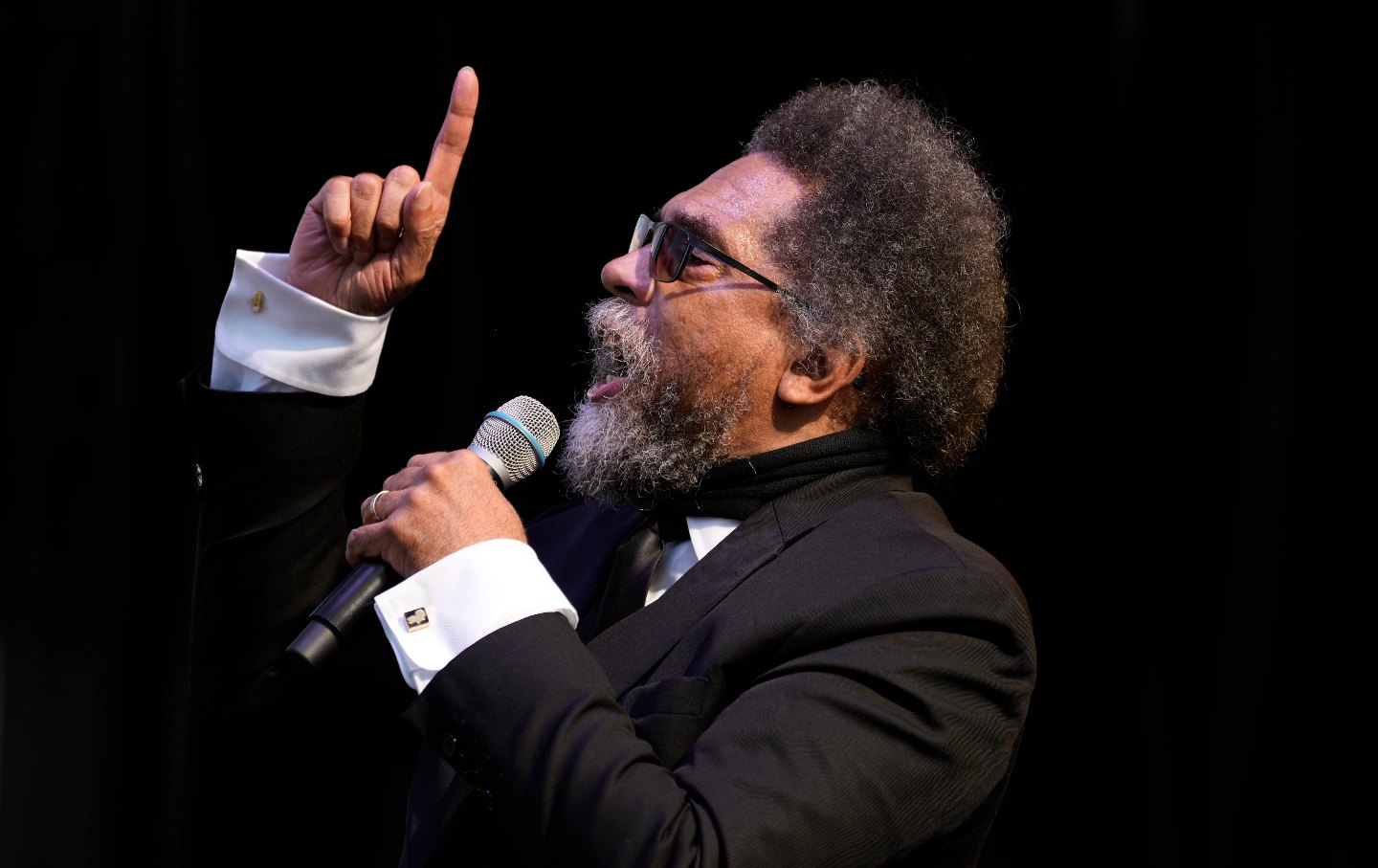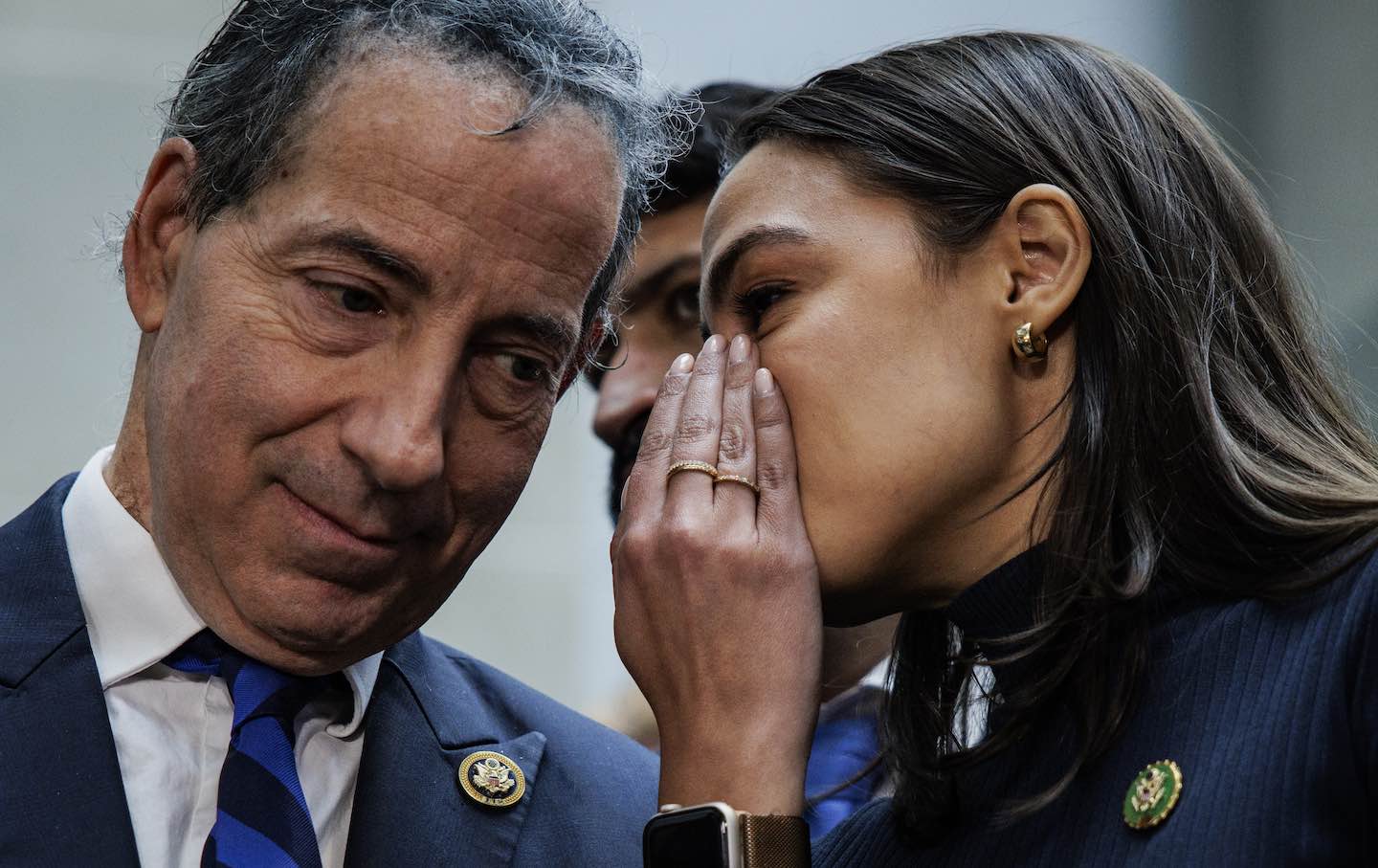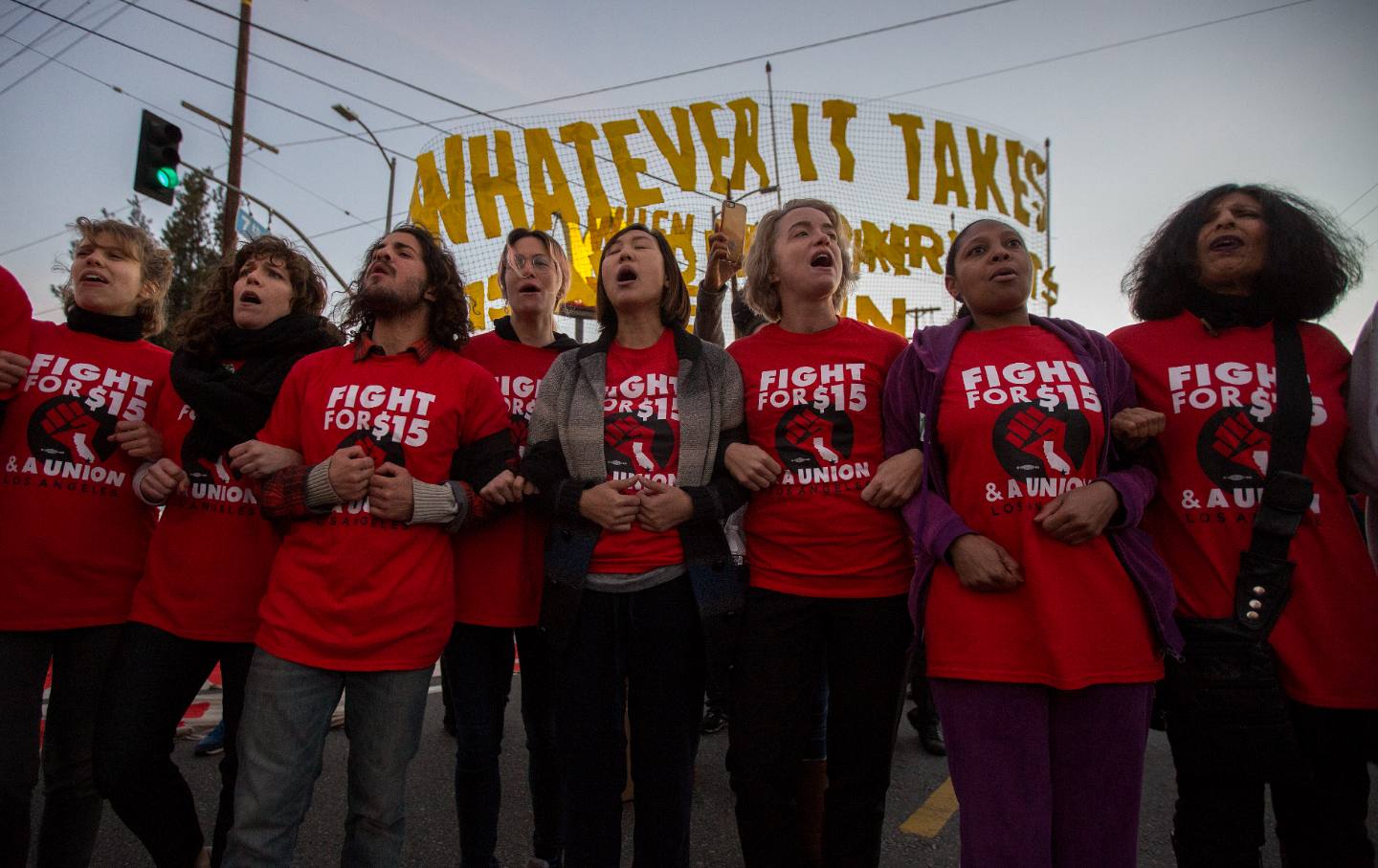Cornel West and RFK Jr. Are Both Helping Biden Now
As two of his rivals head into the wilderness, the president is consolidating the left-of-center vote.

Joe Biden has finally caught a break. Since the messy end of the American occupation of Afghanistan in 2021, both his presidency and his reelection chances have seemed dangerously fragile. Although the American public long ago lost its appetite for continued intervention in Afghanistan, the ugly images of the triumphant Taliban and fleeing refugees undermined faith in Biden’s competence.
The impression of a presidency that had lost control was deepened by persistent inflation, media attention to Biden’s age—at 77, Trump is only three years younger—and division in the party (particularly the sabotaging of Biden’s agenda by conservative Democrats like Joe Manchin, who is threatening to leave the party, and Kyrsten Sinema, who has already left the party). Biden’s attempt to reanimate his base with student debt relief was undermined by the Supreme Court. No wonder his approval ratings are anemic (hovering between 38 percent and 44 percent since the fall of 2021). A CNN poll last month also showed that 67 percent of voters who are Democrats or Democrat-leaning would prefer that someone other than Biden serve as the party’s nominee.
Biden has two things going for him that ensure he’ll be the nominee—and also, despite everything, still has a decent shot at reelection. The first is that mainstream Democratic elected officials, ranging from Bernie Sanders on the left to Joe Manchin on the right, have consolidated around him (although Manchin might still run in the presidential race as an independent candidate for No Labels, a centrist spoiler movement). The only challenges to Biden have come from long-shot insurgents: the best-selling author Marianne Williamson and the lawyer-activist Robert F. Kennedy Jr. In addition to these two Democratic rivals, the academic-activist Cornel West has launched a presidential campaign to run as a third-party candidate.
The second factor Biden has going for him is that, far from harvesting anti-Biden sentiment, two of these insurgent campaigns are heading into the political wilderness. West is having a hard time settling on a political party to serve as a vehicle for his ambitions to reenergize the left. He started off as a candidate for the minuscule People’s Party (which had little or no ability to get a presidential candidate on the ballot), then moved to the Green Party (which has had a record of being able to secure ballot access in a critical mass of states), and finally, on Thursday, announced that he is simply running as an independent. Over the last few weeks, Robert Kennedy has also been indicating an intent to run as an independent, while also flirting with the idea of running as a candidate with the Libertarian Party.
Both West and Kennedy are retreating from the one path they have to really influence national power: showing that there is a vibrant left opposition to Biden inside the Democratic Party. Williamson is still in the fight—but so far she has failed to gain any traction. Her poll numbers among Democratic primary voters have, to date, plateaued at 4 percent. Kennedy had three times that support; still low, but a stronger beachhead. As Kennedy leaves the field, Williamson has another opportunity to make her pitch.
The latest moves of West and Kennedy, for better or worse, strengthen Biden’s stranglehold on left-of-center American politics. While we can welcome the fact that Biden now has a stronger shot at winning reelection, needed internal debate within the Democratic Party will now be stifled.
In a cogent July 6 editorial for The Nation, editor D.D. Guttenplan and magazine president Bhaskar Sunkara made the case that West should take over the mantle of Bernie Sanders as the left opposition within the Democratic presidential primary. The logic was clear: West is a visionary thinker, a compelling orator, and has a sharp critique of Biden-style centrism. West was in good position to raise the salience of all the issues Biden prefers to paper over or ignore.
The editorial argued, “Instead of taking his bat and ball and retreating to the margins, we believe West should seek out the truly national stage that running as a Democrat would bring. Instead of letting Robert F. Kennedy Jr. leverage his family name—and his following as an anti-vaccine crusader—into an ersatz challenge from the left, West should mount a real one, offering the radical solutions he’s always championed, including on war and peace, and which we believe this country desperately needs.”
Unfortunately, politicians rarely heed sensible editorial advice, and West, in addition to all the other hats he wears, is now a politician. He’s also well on the road toward further marginalization. Running as an independent candidate without a party, West faces an impossibly steep path to gain relevance. The American political system is already rigged against third parties, let alone candidates running without a party. It’s quite possible that West will fail to be on any ballots at all. His presidential run feels increasingly Quixotic and confused. It’s a sad turn for an activist who, if he tried to mobilize the voters in the Democratic Party who want a change, could still have a massive impact on national politics.
Liberals who worried that West might be a spoiler, along the supposed lines of previous Green Party candidates Ralph Nader in 2000 and Jill Stein in 2016, can rest easier.
But the great liberal fear of spoiler candidates was always overblown. The effect of third-party left-wing candidates is complicated and ambiguous. There is no decisive proof that Stein cost Hillary Clinton the 2016 election, and Democrats would be far better served by working to activate demobilized voters rather than complaining about spoilers.
Indeed, one could just as plausibly argue that, rather than stealing votes from the Democratic candidates, radical challengers mobilize alienated nonvoters, whom Democrats then have a chance to win over if they make the effort (as Biden did in 2020 by partially adopting Sanders’s pledge to forgive student loan debt).
Popular
“swipe left below to view more authors”Swipe →One problem with the liberal “spoiler” narrative is that it ignores the fact that both Republicans and Democrats often face third-party rivals. The size of Bill Clinton’s Electoral College victories in 1992 and 1996 was surely due to Ross Perot’s Reform Party run. The libertarians have been a persistent splinter force on the right for decades.
If Kennedy does run on the Libertarian Party line, there’s a real chance that he’ll siphon off votes from Trump rather than Biden. In The Washington Post, Aaron Blake observed that, “while Kennedy is a lifelong Democrat from the country’s preeminent Democratic family, there is plenty of reason to believe that a third-party bid could hurt Donald Trump more than Biden.” This is because Kennedy, despite his longtime environmentalist activism, is now much more associated with his anti-vaxxing position, which resonates more with GOP voters.
Blake notes that
Republicans like Kennedy a heck of a lot more than Democrats do. That was true pretty shortly after he launched his campaign in April, and the gap has now grown into a chasm. The latest polling from Quinnipiac University shows that Republicans like Kennedy by a 30-point margin, 48 percent favorable to 18 percent unfavorable.
Democrats, meanwhile, have developed an overwhelming distaste. The Quinnipiac poll shows just 14 percent have a favorable opinion of him, compared with 57 percent who have an unfavorable one.
Of the two major political challenges to Biden’s primacy among left-of-center voters, one has decided to pursue a path of self-marginalization and the other is likely to either do the same or run as a Libertarian (and thereby hurt Trump more than Biden). Yet even as Biden reaps a marginal advantage from the trajectory of the West and Kennedy campaigns, the real problem with his reelection bid remains.
There is a serious enthusiasm shortage on the presidential level, and most Democrats still want an alternative. The Democrats have put all their eggs in the worn-and-torn basket of Joe Biden. That remains an immensely dangerous gamble—especially when the alternative is Donald Trump.
More from The Nation

Democrats Are Overdue for New Leadership Democrats Are Overdue for New Leadership
To mount an opposition under the coming Trump administration, the party needs new ideas—not the same establishment clinging to power.

Why Democrats Are Losing Americans Without a College Degree—and How to Win Them Back Why Democrats Are Losing Americans Without a College Degree—and How to Win Them Back
Voters intuitively know that the economy has not worked well for most of us for decades. Democrats must offer them a transformative vision, and stick to it for as long as it takes...






